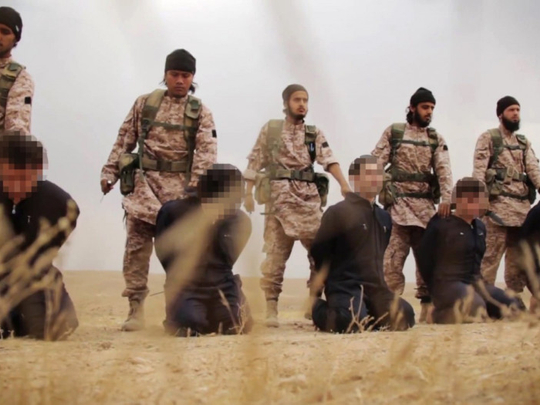
Daesh (the self-proclaimed Islamic State of Iraq and the Levant) has outlawed the circulation of two Syrian banknotes issued by President Bashar Al Assad’s government in Damascus, in what some believe could be a precursor to a complete phasing out of Syrian currency in areas under the terror group’s control.
Religious police in Daesh’s de facto capital of Raqqa has outlawed the 500 and 1,000 Syrian pound notes, issued in 2013 by the Syrian government in Damascus. The illegal currencies are to be replaced with older or smaller bills and dumped in areas outside Daesh’s controls, according to a memorandum obtained by Syria Deeply.
The announcement reads:
‘Announcement to all Exchange Shops: We have decided ... to ban the use of the newly issued currency by the Alawite regime (the 1,000 bill and the 5,00 bill) in our territory, starting the date of the announcement, September 27. Exchange shops should not use it or exchange it. They should only take it out of the Islamic State areas. And anyone who opposes this law will be punished, starting from November 14.’
“[Daesh] has informed all currency and exchange businesses about the new law,” Abu Mahmoud, the owner of a currency exchange business in Raqqa, told Syria Deeply. “They instructed us to take the newly-issued bills and replace them with either older issues or smaller bills. We’ve been instructed to take the newly issued bills that we gather outside [Daesh’s] borders, to areas controlled either by the regime or by other opposition factions.”
Members of Raqqa’s Hisbah office — Daesh’s religious police — claim that the reason behind the new law, which was issued at the end of September 2015, is to protect citizens under the group’s control from financial loss.
“We prohibited their circulation in order to protect Muslims from financial losses,” said Abu Mohammad, a 37-year-old member of Daesh. “There are other bills that people can use. We want them to exchange these newly-issued bills with other ones, so that they do not lose any money, especially if they want to use them outside Syria.”
According to Mohammad, Daesh will soon issue its own currency — a gold, silver and copper coinage rumoured to be prohibitively expensive — which will be the only currency accepted in areas under the group’s control.
Citizens of Raqqa with whom Syria Deeply spoke, however, said the new law was a pretext for Daesh’s foreign cadre to garner extra profits from the currency exchange business.
Mazen Al Abdullah, a 28-year-old media activist from Raqqa, believes the new law is just another technique Daesh will use to exploit people under its control. “For months now,” Abdullah told Syria Deeply, “the word on the street has been that [Daesh] would issue its own gold and silver currency, and that Syrian currency would eventually be eliminated.”
Most of the extremist organization’s non-Syrian fighters have a hand in the currency exchange business, according to Al Abdullah, arguing that the currency switch isn’t just a simple state-building move by Daesh, but a scheme to make money. Exchange offices in Raqqa and throughout the majority of Daesh territory are either fully or semi-controlled by foreign members of Daesh.
Businessmen, storeowners and average employees alike are afraid the value of their Syrian currency in Daesh areas will soon completely collapse. “All my cash savings are in the newly issued 500 and 1,000 pound bills,” said Abu Bassil, a 45-year-old man from Raqqa. “According to the new law, I have to exchange them as soon as possible. I can hand them over and receive smaller or older issue bills. But I’m afraid [Daesh] will issue its own currency soon, and in that case, I might lose all my savings.”
“The Syrian pound is worth a great deal less than it used to be, and it’s only getting worse. I’ll probably lose about one-third of my savings. But I guess one-third is better than losing all of it,” Abu Bassil said. Rumours that Daesh’s monetary authorities in Raqqa may soon issue their own currency have left Raqqa’s citizens equally panicked.
While the question remains whether the currency switch is just for show, or a secret money-maker for Daesh foreign elites, Al Abdullah, the media activist, is sure of one thing: Somebody’s making money off the switch. “We’re talking about exchanging and taking an entire currency off the market,” he said. “There’s a lot of money to be made.”
— Worldcrunch 2015/New York Times News Service









